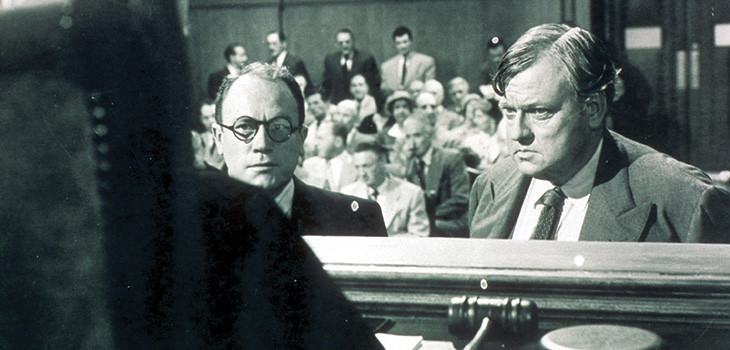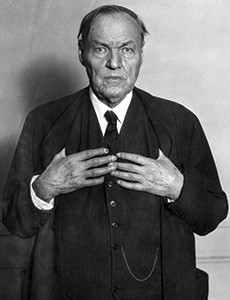*/

A terrifying film relevant to lawyers then and now, writes David Langwallner
‘You may hang these boys; you may hang them by the neck until they are dead. But in doing it you will turn your face toward the past... I am pleading for the future; I am pleading for a time when hatred and cruelty will not control the hearts of men. When we can learn by reason and judgment and understanding and faith that all life is worth saving, and that mercy is the highest attribute of man.’ From Clarence Darrow’s 12-hour closing speech in Leopold & Loeb 1924
The greatest American trial lawyer of the century, in terms of notoriety and success, was Clarence Darrow. Unlike other trial lawyers, he stood for certain things. Darrow was part of the movement known as Progressivism, a belief (now somewhat quaint) in scientific progress and pragmatism; the notion that society should develop in progressive terms.
Darrow did not judge his clients or shy away from controversy – whoever they were and however viewed in the eyes of the public. Thus, the sobriquet ‘lawyer for the damned’.
The damned in this case were Leopold and Loeb, subjects of the film Compulsion. Based on the 1956 novel of the same name by Meyer Levin and directed by the renowned Richard Fleischer, this is a fictionalised account of the murder trial. (There was a suit by Leopold against Levin for playing fast and loose with the truth but it was dismissed; any privacy rights forfeited by the so-called ‘crime of the century’.)
In spirit, the film stays close to the fundamental truth of what happened. Imbued with a sense of privileged Übermensch superiority, Dean Stockwell plays Judd Steiner (based on Nathan Leopold Jr) and Bradford Dillman plays Artie Strauss (based on Richard Loeb), rich college students who kill a younger boy, Paulie Kessler (based on Bobby Franks) in order to commit the ‘perfect crime’. But the key evidence of Steiner’s unusual eyeglasses undermines them, as does his unusual candour in condemning the boy to the police, as well as a clearly fabricated alibi.
Orson Welles (typecast) plays famed attorney Jonathan Wilk (based on Darrow) who is urged to adopt a not guilty but insane plea. He thought rightly no jury would buy it. Born to rule. Noblesse oblige. It would not have played well. But in our darker age? E G Marshall plays District Attorney Harold Horn who also, to some extent, puts Wilk on trial. In fact, for his late career Darrow was always on trial. It was a case of trying the lawyer and his ideas as well as his client.
Therein ensues the most important sentencing hearing in history, arguably since Socrates. Diminished responsibility leading ultimately to no death penalty. The greatest plea in mitigation. Saved from hanging by one of the most famous and impassioned closing speeches against capital punishment.
Darrow as a progressive was not a believer in free will but argued that societal considerations, environment and hereditary shaped a person’s destiny whatever their background. Thus, even Leopold and Loeb were, in his view, victims of circumstances – a remarkable extension of human empathy.
He succeeded brilliantly although the judge did not, in point of fact, accept the psychiatric evidence. Ultimately, sub silentio it influenced the life imprisonment sentence. The judge said he decided in accordance with precedent to discount the closing speech. I doubt it. It is the finest of the greatest of American trial lawyer speeches.
But there are even more significant observations relevant to our time. Compulsion is about the imposition of power by the over-entitled in our neo liberal universe and the assumption of superiority based on, what exactly? It is about, in today’s criminal lawyer terms, coercive and abusive relationships based on power and the inequality of bargaining. Not least money and influence.
It might be noted that Leopold and Loeb not only gave rise to Compulsion but also indirectly to Alfred Hitchcock’s Rope (1948), where the murder is of a more vulnerable adult – in effect, the phenomenon of the younger cuckooing the older adult. Another feature of coercive behaviour and sadly redolent of our age.
Welles recovered from the disappointment of not being selected to direct Compulsion (and the neglect of his masterpiece Touch of Evil) with a Cannes Film Festival Award for Best Actor. It was the statue he used to stub out cigars, he told me once in The Gate Theatre Bar in Dublin. His incandescent performance was just another ‘nixer’ to pay the bills – which is not to negate the message of this terrifying film.


‘You may hang these boys; you may hang them by the neck until they are dead. But in doing it you will turn your face toward the past... I am pleading for the future; I am pleading for a time when hatred and cruelty will not control the hearts of men. When we can learn by reason and judgment and understanding and faith that all life is worth saving, and that mercy is the highest attribute of man.’ From Clarence Darrow’s 12-hour closing speech in Leopold & Loeb 1924
The greatest American trial lawyer of the century, in terms of notoriety and success, was Clarence Darrow. Unlike other trial lawyers, he stood for certain things. Darrow was part of the movement known as Progressivism, a belief (now somewhat quaint) in scientific progress and pragmatism; the notion that society should develop in progressive terms.
Darrow did not judge his clients or shy away from controversy – whoever they were and however viewed in the eyes of the public. Thus, the sobriquet ‘lawyer for the damned’.
The damned in this case were Leopold and Loeb, subjects of the film Compulsion. Based on the 1956 novel of the same name by Meyer Levin and directed by the renowned Richard Fleischer, this is a fictionalised account of the murder trial. (There was a suit by Leopold against Levin for playing fast and loose with the truth but it was dismissed; any privacy rights forfeited by the so-called ‘crime of the century’.)
In spirit, the film stays close to the fundamental truth of what happened. Imbued with a sense of privileged Übermensch superiority, Dean Stockwell plays Judd Steiner (based on Nathan Leopold Jr) and Bradford Dillman plays Artie Strauss (based on Richard Loeb), rich college students who kill a younger boy, Paulie Kessler (based on Bobby Franks) in order to commit the ‘perfect crime’. But the key evidence of Steiner’s unusual eyeglasses undermines them, as does his unusual candour in condemning the boy to the police, as well as a clearly fabricated alibi.
Orson Welles (typecast) plays famed attorney Jonathan Wilk (based on Darrow) who is urged to adopt a not guilty but insane plea. He thought rightly no jury would buy it. Born to rule. Noblesse oblige. It would not have played well. But in our darker age? E G Marshall plays District Attorney Harold Horn who also, to some extent, puts Wilk on trial. In fact, for his late career Darrow was always on trial. It was a case of trying the lawyer and his ideas as well as his client.
Therein ensues the most important sentencing hearing in history, arguably since Socrates. Diminished responsibility leading ultimately to no death penalty. The greatest plea in mitigation. Saved from hanging by one of the most famous and impassioned closing speeches against capital punishment.
Darrow as a progressive was not a believer in free will but argued that societal considerations, environment and hereditary shaped a person’s destiny whatever their background. Thus, even Leopold and Loeb were, in his view, victims of circumstances – a remarkable extension of human empathy.
He succeeded brilliantly although the judge did not, in point of fact, accept the psychiatric evidence. Ultimately, sub silentio it influenced the life imprisonment sentence. The judge said he decided in accordance with precedent to discount the closing speech. I doubt it. It is the finest of the greatest of American trial lawyer speeches.
But there are even more significant observations relevant to our time. Compulsion is about the imposition of power by the over-entitled in our neo liberal universe and the assumption of superiority based on, what exactly? It is about, in today’s criminal lawyer terms, coercive and abusive relationships based on power and the inequality of bargaining. Not least money and influence.
It might be noted that Leopold and Loeb not only gave rise to Compulsion but also indirectly to Alfred Hitchcock’s Rope (1948), where the murder is of a more vulnerable adult – in effect, the phenomenon of the younger cuckooing the older adult. Another feature of coercive behaviour and sadly redolent of our age.
Welles recovered from the disappointment of not being selected to direct Compulsion (and the neglect of his masterpiece Touch of Evil) with a Cannes Film Festival Award for Best Actor. It was the statue he used to stub out cigars, he told me once in The Gate Theatre Bar in Dublin. His incandescent performance was just another ‘nixer’ to pay the bills – which is not to negate the message of this terrifying film.

A terrifying film relevant to lawyers then and now, writes David Langwallner


The Chair of the Bar sets out how the new government can restore the justice system
In the first of a new series, Louise Crush of Westgate Wealth considers the fundamental need for financial protection
Unlocking your aged debt to fund your tax in one easy step. By Philip N Bristow
Possibly, but many barristers are glad he did…
Mental health charity Mind BWW has received a £500 donation from drug, alcohol and DNA testing laboratory, AlphaBiolabs as part of its Giving Back campaign
The Institute of Neurotechnology & Law is thrilled to announce its inaugural essay competition
How to navigate open source evidence in an era of deepfakes. By Professor Yvonne McDermott Rees and Professor Alexa Koenig
Brie Stevens-Hoare KC and Lyndsey de Mestre KC take a look at the difficulties women encounter during the menopause, and offer some practical tips for individuals and chambers to make things easier
Sir Geoffrey Vos, Master of the Rolls and Head of Civil Justice since January 2021, is well known for his passion for access to justice and all things digital. Perhaps less widely known is the driven personality and wanderlust that lies behind this, as Anthony Inglese CB discovers
The Chair of the Bar sets out how the new government can restore the justice system
No-one should have to live in sub-standard accommodation, says Antony Hodari Solicitors. We are tackling the problem of bad housing with a two-pronged approach and act on behalf of tenants in both the civil and criminal courts